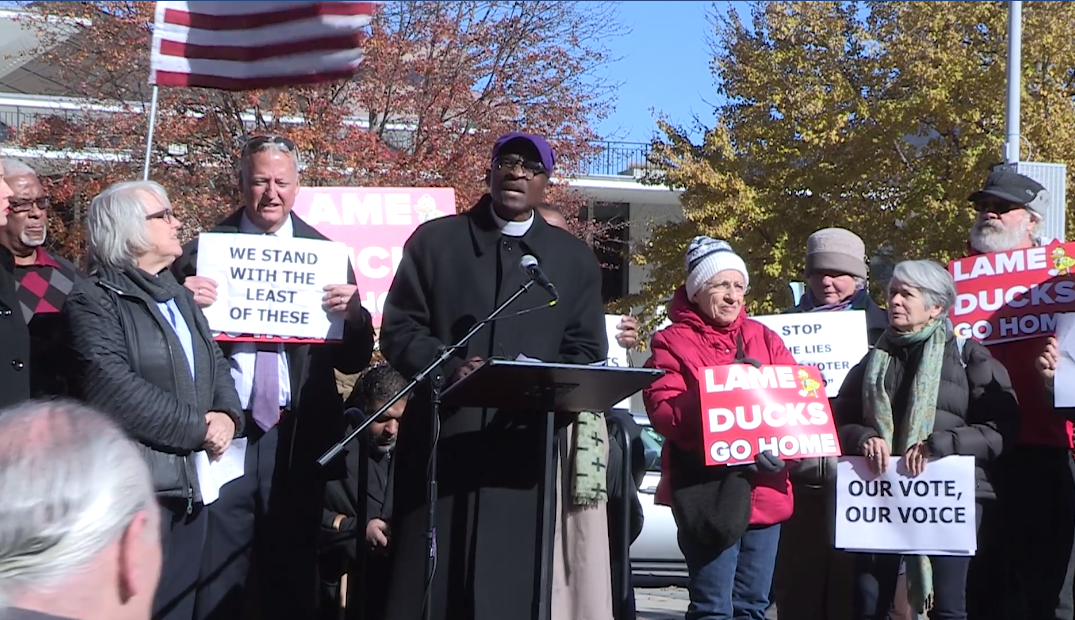Another blow to North Carolina's new voter ID law

Rev. T. Anthony Spearman of the N.C. NAACP addresses a crowd protesting the North Carolina legislature's voter ID proposal in November 2018. (Image is a still from this Common Cause NC video.)
Last week, the North Carolina Court of Appeals ordered the state not to enforce a 2018 voter ID law because it was likely motivated by an unconstitutional goal of suppressing black votes.
The law is "likely to disproportionately impact African American voters," a three-judge Court of Appeals panel unanimously ruled. It noted that the Republican legislators who wrote the law declined to allow voters to use the types of photo IDs that black voters were more likely to possess. The North Carolina constitution guarantees equal protection of the laws and bars racial discrimination by the state.
The voter ID law wasn't in effect for the 2020 primary election, in which early voting began Feb. 13, because a federal court issued a similar order blocking the law back in December. Both the federal and state cases will go to trial this year, and the courts will rule on whether lawmakers intended to discriminate against black voters.
The orders to block the law came down as the Kentucky legislature began debating a voter ID bill that law professor Josh Douglas warned is also likely to have a disproportionate impact on "racial minorities, poor people, the elderly, students, and others."
The North Carolina legislature passed the voter ID law in December 2018, a month after voters approved an amendment to the state constitution that says a photo ID "shall be required to vote." The Court of Appeals noted that the amendment "allows for exceptions to any voter ID law, yet the evidence shows the General Assembly specifically included types of IDs that African Americans disproportionately lack."
The judges overturned a lower court's decision not to block the law. The lawsuit was filed on behalf of voters by the Southern Coalition for Social Justice, a voting rights group based in Durham. Both the state and federal cases will go to trial this year.
The new law is North Carolina's second voter ID mandate in the last decade. The Court of Appeals' opinion reviewed the history of North Carolina's 2013 voter ID law, which a federal court found had targeted black voters "with almost surgical precision." Lawmakers had requested state data on possession of IDs by race, and they required voters to use IDs that white voters were more likely to have. Federal courts struck down that law.
The appeals court said the "evidence tends to show that legislators relied on the same data" in crafting the new bill. Lawmakers again cited concerns about "voter fraud" in justifying the law, even though studies have shown that in-person voter fraud is extremely rare.
The court is also reviewing a 2019 decision by a judge to strike down the voter ID amendment itself. The amendment was narrowly approved for the ballot by three-fifths of the legislature, as the state constitution requires. But at the time, a federal court had already declared that the legislature had been elected in unconstitutional, racially gerrymandered election districts. The court ruled the amendment invalid, because the legislature had "lost its claim to popular sovereignty" at that point.
Questions of fairness
Republican lawmakers criticized the appeals court and argued that it defied voters who passed the ID amendment. State House Speaker Tim Moore, a defendant in the lawsuit, blasted "judicial attempts to suppress the people's voice in the democratic process" — even though the process that led to the law was widely criticized as un-democratic.
The bill was passed during a lame-duck session in December 2018, just weeks before Republicans lost a legislative supermajority that allowed them to override a veto by Democratic Gov. Roy Cooper. In fact, lawmakers changed the rules to allow them to override the veto more quickly than usual. In its ruling, for example, the court quoted Democratic state Rep. Pricey Harrison's description of the process to pass the bill in just eight days as "abbreviated and inadequately deliberative."
The legislature had followed a similarly rushed process for passing the voter ID amendment in June 2018. The House, for example, passed the amendment after only a few minutes of deliberation.
Republican legislative leaders have said they plan to appeal the latest voter ID ruling to the North Carolina Supreme Court, which has the final say on interpreting the state constitution. The high court is currently composed of six Democrats and one Republican.
All three judges behind last week's decision are Democrats who were elected in 2018, when the amendment was ratified. A conservative think tank, The Civitas Institute, argues that two of them, John Arrowood and Toby Hampson, should have recused themselves because they answered a candidate questionnaire distributed by a Durham-based political group in which they both said they planned to vote against the voter ID amendment.
Civitas has filed a complaint with the state's Judicial Standards Commission, alleging that Arrowood and Hampson violated ethics rules by deciding the case. The rules require judges to appear unbiased and to sit out cases in which their "impartiality may reasonably be questioned." Judges are also required to "abstain from public comment about the merits of a pending proceeding." The complaint from Civitas claims the judges violated this rule, but the voter ID law hadn't even been passed, much less challenged in court, when they answered the questionnaire.
Tags
Billy Corriher
Billy is a contributing writer with Facing South who specializes in judicial selection, voting rights, and the courts in North Carolina.
